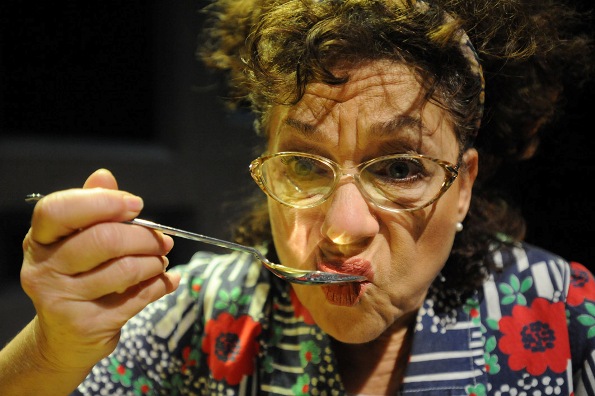
With a song and a smile, Schitz scrapes off the thin sugary veneer of human existence, biting into the wormlike thoughts and squirming scheming emotional tangle within. Hanoch Levin’s play is directed by Yagil Eliraz, with music by Adi Zisman.
Levin’s rough and tumble no-holds-barred humor, a facility and freedom with language and imagery bordering on a verbal drunken spree, is treated here to an interpretation that makes excellent use of the text and its possibilities. The play opens on a dark set, without words, only the sound of a spoon scraping the bottom of the bowl and lackadaisical slurping indicates the family meal. When the stage lights come on they reveal a deliberately abstract set, designed by Roni Carmel: a long table composed of three modular units, and a gray wall with frame-like openings in different sizes, suggesting a living room wall peppered with paintings or family photos. At one end of the table is Tsesha, the mother (Esti Kosovitzki), in a classic red flowered house dress and frizzy hair. At the other end is the daughter, Schprachtzi (Irit Kaplan) an over-grown little girl in a doll-like pink flowered dress and pig-tails. The father, Fefechts (Rami Baruch) is in the center.
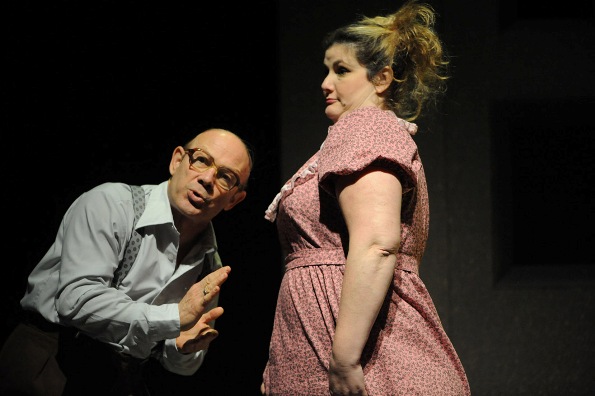
Delicacy and subterfuge are hilariously shoved aside by dialogue that could not possibly be more explicit. When the mother tells her daughter “Nu, get married already, you are already dry” and the daughter responds along the lines of “Why don’t you die already?” there’s no need to search hard for subtext, or is there? Schitz plunges us into a surreal world of family life accompanied by live music (Adi Zisman on piano and Yehonatan Givoni on percussion), with a cabaret feel. From Schprachtzi’s plaint “let a man come my way” to Fefechts’ anthemic “I have two trucks,” Zisman’s music lures the listener into rhythmic complicity, much as Eliraz’ comedic staging lulls us into laughter at the romantic foibles of Schprachtzi and her beau Tcharchess (Alon Dahan), who only want to live a little, love a little, and do away with Dad.
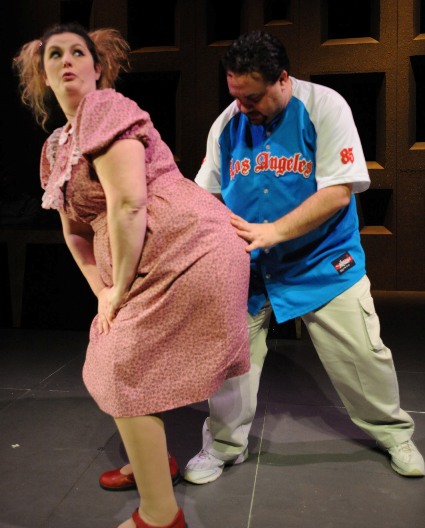
It’s a tour de force tour of humanity’s low points, just as you think they’ve plundered the depths of depravity and loathsomeness, they sink a little lower. All four cast members are incredible, with one memorable scene after another with a range that embraces the broadest humor as well as poignant nuances. It is a tremendously entertaining play, and more.
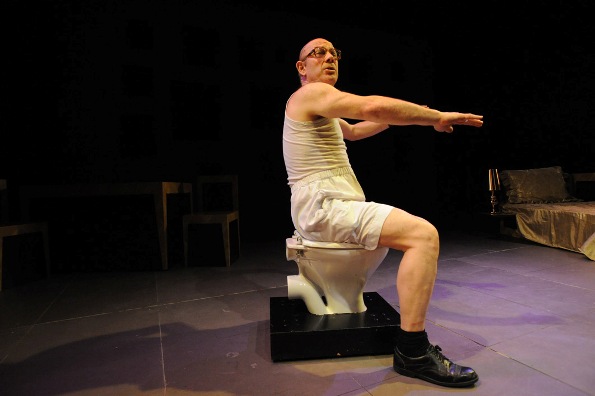
The play exposes every sleazy sinew of human desire in all its ugliness and vulnerability. Schprachtzi, the obedient puppet of a daughter at home, the wallflower at the party snack bar “growing uglier by the minute” and the seductress on the prowl, ready to do whatever it takes (with some creative costume help) to seal the deal. Tsesha, a small woman with small manipulations, attaching herself to any small hope for advancement or amusement, her survival depends on the extent to which the others are dependent on her.
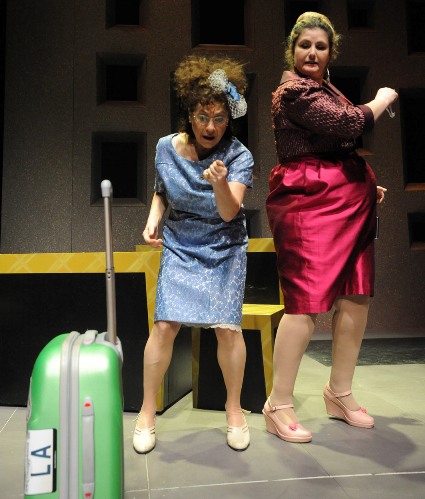
One of the most striking scenes occurs when Tsesha begs to join Schprachtzi at a café and the newly married, newly powerful daughter replies: “Women like you walk by cafés on their way to Kupat Holim (Israeli HMO)…I can’t give up my comforts, if that’s what you wanted you should have educated me when I was a child…Bye – we’ll come over for a holiday dinner to eat and leave you to clean up the mess.” Fefechts has his moments of glory – a self-satisfied tap dance reveling in his assets, and desperation – appreciated only for his money; he throws a tantrum in the midst of negotiations with the groom-to-be: “the father would like just for once to receive rather than to give!” Tcharchess, the groom whose “desires are small and disappointments are small” achieves the pinnacle of sleaze, having apparently no redeeming qualities whatsoever, yet ultimately, he too is vulnerable.
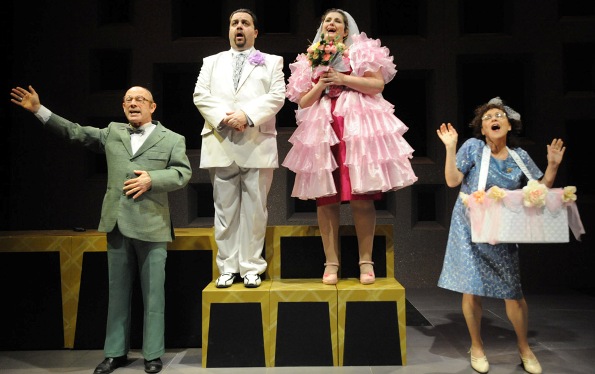
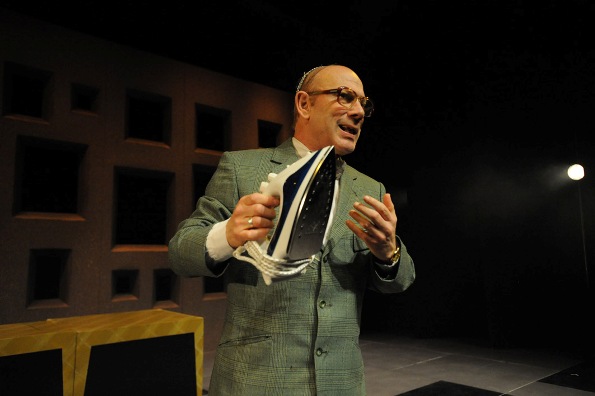
Pushing the envelope of acceptable behavior – the wedding scene is outrageously wonderful – puts the question out there: what are we willing to accept? Levin introduces small notes that connect private to public, individual to collective ethics, a theme that builds subtly and gradually to its final crescendo. The small acts of cruelty and loathsomeness inside the family and the indifference to (and willingness to profit from) human suffering on a grand scale are intimately connected.
Schitz, directed by the playwright Hanoch Levin, first premiered at the Haifa Theatre in 1975. As a commentary on Israeli culture and its greater context it remains as relevant today as it was then, a testimony to the strength of the play and the tragedy of our lives.
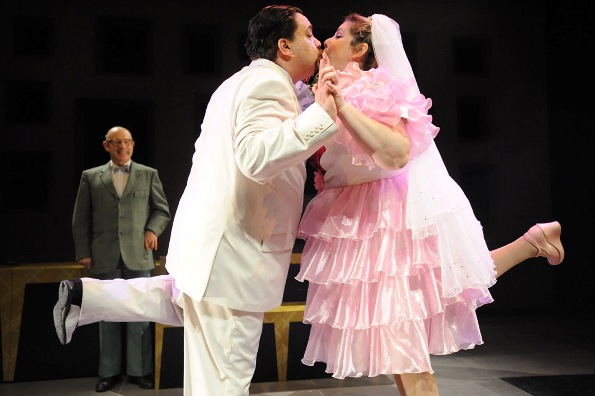
Shitz, by Hanoch Levin, Directed by Yagil Eliraz
Music: Adi Zisman
Set and costume design: Roni Carmel
Lighting: Jake Sliv
Dramaturgy: Shai Shabtay
Movement: Meirav Alhadef
Performers: Rami Baruch, Esti Kosovitzki, Alon Dahan and Irit Kaplan
Piano: Adi Zisman, Percussion: Yehonatan Givoni
Photographs: Gadi Dagon
Duration: 1 hour, 30 minutes
The Cameri Theatre, 19 Shaul Hamelech Boulevard, Tel Aviv
Performance dates and times available on the Cameri website.
The Cameri Theatre production of Hanoch Levin’s play, directed by Yagil Eliraz, with music by Adi Zisman, is a tribute to the Mara Theatre of Kiryat Shmona, founded by Menachem Ainy z”l, in 1999.






Thanks for the review. Now I want to see it!
Comments are closed.